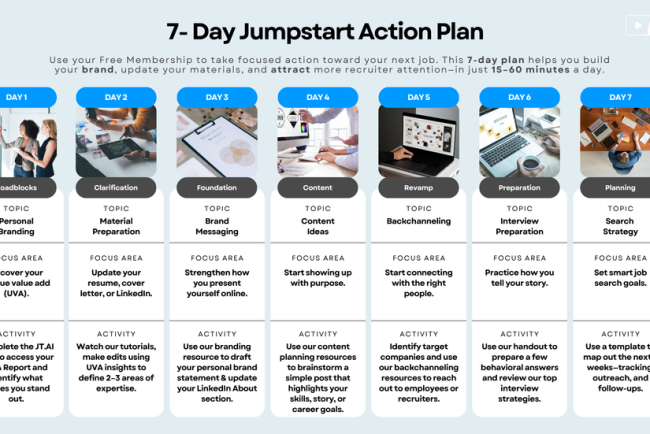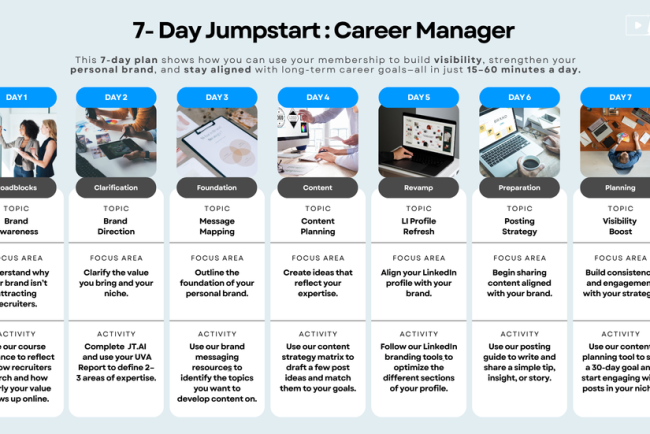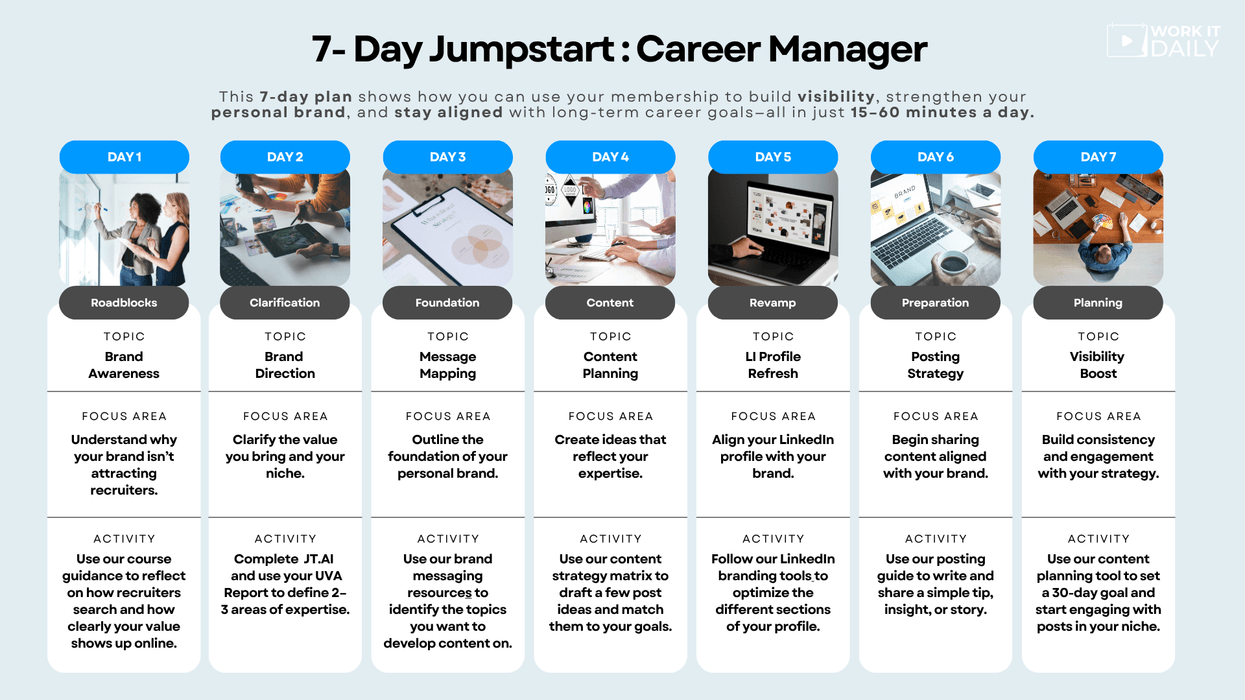
by Admin
The Perfect Way To End Your Next Cover Letter (With Examples)
A well-written cover letter serves as an introduction to both your resume and your personal brand as a job seeker. It’s your chance to express enthusiasm for the role and make a direct connection between who you are and why you’re the best fit for […]
Career development
by Admin
How To Successfully Manage Your Career Goals
When it comes to setting and managing career goals, it’s important to aim high. But sometimes the challenge we all face in aiming high is putting too much pressure on ourselves and then becoming overwhelmed. Successful career planning is all about balance. The best way […]
Career development
by Admin
5 Mistakes That Are Killing Your LinkedIn Profile
If you’ve been satisfied with a “placeholder” LinkedIn profile up to this point, or feel like landing a job through the site isn’t a viable option, we’ve got some news for you. The hiring landscape has changed, permanently, and those who adapt will secure the […]
Career development


7 Vital Habits Of The Successful Professional
by Admin
Who isn’t a little curious about what a successful professional does differently from the average person? It’s not about what they do with their money. It’s how they approach their careers. Passenger or Pilot: Which One Are You? It’s easy to think we are all […]
Career development
Who isn’t a little curious about what a successful professional does differently from the average person? It’s not about what they do with their money. It’s how they approach their careers.
Passenger or Pilot: Which One Are You?
It’s easy to think we are all doing what we can to take control of our careers. However, this article points out a misconception some people have: thinking they lack control over certain aspects of their career. Or worse, not even bothering to try to take control.
In our careers, we are either a:
A) Passenger – an employee held hostage by golden handcuffs.
B) Pilot – a business-of-one who is in charge of their destiny.
I can see why being a passenger in your career might be attractive. You get to leave the scary, intense work of navigating to the pilot. But is that what you really want? Currently, I’m seeing a shift in our workforce’s mentality.
More and more people are seeking professional emancipation as part of the natural evolution of the employee. They are tired of being a passenger and want to learn how to become the pilot of their career. That being said, here are seven tips for those seeking to become an ultra-successful professional…
1. Realize You’re A Business-Of-One

Your career has equity. Recognize it and start to determine how to use it to your advantage.
Inventory your assets as a professional and determine who is willing to pay top dollar for them. If you don’t have valuable skill sets that are in demand, start acquiring some. Think like an entrepreneur: track your professional ROI, invest in your development, and market yourself accordingly. Your personal brand is your business identity, and how you manage it will determine your long-term career success.
2. Always Look To Gain An Advantage In Your Business Dealings

You must negotiate with employers. Don’t take what is given to you without a discussion. An employer is a customer who is always looking for the best deal, and you’re the business-of-one providing a service for them. You want to do business with a customer willing to pay for the quality of work you provide.
Learn to effectively negotiate salary, perks, and other benefits so you feel good about the partnership. You don’t work “for” an employer. You work “with” an employer. Understand your market value and be ready to advocate for it. The more strategic you are in these conversations, the more you’ll shape a career aligned with your goals.
3. Do Things Well

Remember that doing things well is more important than doing new things.
Get focused on building your expertise and understanding how you are the aspirin to an employer’s pain. You must be great at a few things, rather than okay at a bunch of things. What is your specialty as a business-of-one? Refine your craft continuously and measure your performance with real outcomes. Quality work builds reputation, trust, and long-term opportunity—especially in competitive industries where consistency is king.
4. Work With People Who Are Smarter Than You

Look for the smartest people you can work with. Find companies you admire and respect. Not for their pay and benefits package, but for the kind of products or services they deliver.
You must seek your professional tribe and partner with them to up your career game. Surrounding yourself with top talent elevates your thinking, challenges your assumptions, and accelerates your growth. Success is contagious. Being part of a high-performing team can fast-track your own development.
5. Get Clear On Your Employer’s Goals, Needs, And Business Intentions

Want to do better in your career? Don’t be so self-centered. It’s not about your needs and wants.
Instead, focus on the needs, wants, and business objectives of the people you are partnering with. You’ll be able to offer more value and get more in return if you do. They are your customer. Exceed their expectations and you’ll have them eating out of your hand. Study the company’s mission, read annual reports, follow leadership updates, and talk to stakeholders. The more aligned you are with your employer’s vision, the more indispensable you become.
6. Be In A Position To Walk Away When The Situation Isn’t Right

Get yourself in a financial position that enables you to quit a job and survive without income for one year. Every job is temporary. You may lose a job. You may want to leave a job. In either case, having the security of savings will give you the power to make the best decisions for your business-of-one.
Who wants to stay in a bad situation just for the money? Ask anyone who held on to a life-sucking job only to get laid off how that worked for them. They’ll tell you they wish they could have left at the first sign of trouble. This financial freedom gives you leverage—something most professionals don’t realize they need until it’s too late. Build your “career runway” now so you can make strategic moves later.
7. Realize You Need Experiences And Setbacks To Move Forward

There is no real failure. We experience, learn, and grow. Stop playing it safe and start embracing your fear. As the old saying goes, “Life begins where your comfort zone ends.” You will not survive and thrive in your career if you don’t constantly learn new things.
Making mistakes teaches us what not to do. That’s a good thing! Stop worrying about what others think and start worrying about what will happen if you don’t take control. Each challenge you face builds resilience, adaptability, and leadership potential. Embrace failure as a career-building tool: it sharpens your judgment and makes you a more valuable asset to future employers.
Success doesn’t happen by accident. It’s the result of consistent, intentional habits practiced over time. I hope these tips help you build strong, sustainable habits that elevate your career and position you as a truly successful professional.
Remember, you’re the CEO of your own career. The choices you make today shape the opportunities you’ll have tomorrow. So, how are you taking ownership of your career right now? What habit will you commit to building this week?
Need more help with your career?
Get access to our Free Resource Center today (no credit card required!).

by Admin
How To Escape The One-Job Trap In 30 Days
I’m going to tell you something that might be hard to hear: if you’re still relying on one job to define your career and secure your future, you’re walking toward a cliff. Over two decades ago, I walked away from corporate America because I didn’t […]
Career development
I’m going to tell you something that might be hard to hear: if you’re still relying on one job to define your career and secure your future, you’re walking toward a cliff.
Over two decades ago, I walked away from corporate America because I didn’t like who I was becoming—burned out, uninspired, and terrified my daughter would grow up thinking misery was just part of adulthood.
That decision launched my journey as a career coach and entrepreneur. Today, I have 2.5 million LinkedIn followers, over 580,000 newsletter subscribers, and 1.2 million TikTok followers. But I didn’t get here by playing it safe. I escaped the one-job trap, and now I teach others how to do the same.
The Truth About Today’s Job Market
We’re at a pivotal moment in career history. At the time I’m writing this (June 2025), over 150 large U.S. companies have already announced major layoffs this month alone. We’re facing what I believe will be the worst white-collar recession we’ve ever seen.
Why? One word: AI.
The founder of Anthropic, one of the world’s biggest AI companies, recently stated that nearly 60% of entry-level white-collar jobs are being eliminated. These roles aren’t coming back. We could see white-collar unemployment hit 20% within five years.
But here’s what that number really means: it refers to traditional unemployment. People with just one job and one source of income. That’s the outdated model we’ve been trained to follow, and it’s collapsing right in front of us.
Why I Call It the “One-Job Scam”
Let’s be honest: the “one-job” model benefits employers far more than it benefits you.
Companies want you to feel dependent on them—clinging to benefits, grateful for job security, less likely to question the long hours and stress. That way, you become what I call a “trad job” worker (traditional job)—one employer, one paycheck, one skill set, dead end.
But we’re waking up. Professionals are starting to see there’s a better way to work and live.
The Time-for-Money Cliff
Most people picture their career like a staircase: you start at the bottom with little experience and low pay, then steadily climb up earning more over time.
That’s not how it actually works.
Your career looks more like a pyramid. You start at the bottom in entry-level roles, move into the mid-level “sweet spot” where things feel good, but then the top starts closing in. There are fewer roles available at your salary level.
That’s what I call the time-for-money cliff.
Every year, new talent enters the pyramid. Companies want profit, so why pay you $120K when they can hire someone with 90% of your skillset for $70K? When you get pushed off that cliff, you land in what I call the “executive wasteland,” filled with smart, experienced professionals who expected continued growth but were blindsided when companies cut them loose.
The Knowledge-for-Money Revolution
Here’s what remote work taught us during the pandemic: when you cut out the commute and worked fewer hours, you still got the same paycheck. Why? Because you were finally being paid for your output, not just your time.
You got a glimpse of what freedom feels like.
This is the shift we need to make permanently. Instead of trading time for money, we need to trade knowledge for money.
Think about it this way: someone has a $10,000 problem. You know how to fix it in 10 minutes. You solve it, and they pay you. Do you feel guilty? Most people do because they’re stuck in the mindset that time equals value. But the client isn’t paying for your time. They’re paying for your expertise, your knowledge, your ability to deliver results.
Your Four-Step Escape Plan
Step 1: Identify Your Unique Value Add (UVA)
Your UVA is what sets you apart in the market—how your skills, experience, and insight save money, make money, solve problems, or alleviate pain for employers.
You’re no longer “just an employee.” You are a business-of-one. And like any successful business, you need to understand your value proposition.
I’ve created a free UVA Discovery Tool that took over a year to develop. Go to workitdaily.com, create your free account, and access the tool—no credit card required. It includes proprietary quizzes designed to draw out your hidden strengths and help you articulate your UVA with clarity.
Step 2: Build Your Credibility on LinkedIn
Most professionals have unknowingly outsourced their reputation to their employers. When you apply for jobs, what do you lead with? A résumé listing their brands, not yours.
That’s not enough anymore. LinkedIn is now the #1 platform for knowledge-based professionals. Recruiters and business owners use it daily to validate expertise and find problem-solvers.
Once you’ve identified your UVA, start creating searchable, benefit-driven content on LinkedIn. Think of it as marketing for your business-of-one. This is how opportunities come to you instead of you chasing them.
Step 3: Monetize Your Knowledge
The knowledge economy is projected to hit $480 billion by 2027. Here are ways my clients are already monetizing their expertise:
- Fractional work: Instead of 60 hours for one company, work with 2-3 companies part-time at premium rates
- Subscription models: Platforms like Subs let people pay monthly to access your professional advice
- Advisory roles: Get paid to share your expertise through professional networks
- Content creation: Earn money when people consume your knowledge-based content
The beauty is you can start while keeping your current job.
Step 4: Scale Multiple Income Streams
I work with former executives who now operate on fractional models. They work fewer hours, solve high-level problems, and earn more money. The companies win because they get specialized expertise without full-time costs. The professionals win because they have control, variety, and higher earnings.
This isn’t just theory. It’s happening right now.
Real Success: How Steve Fast-Tracked His Career
Let me share a recent example. Steve, a global IT sales director, wanted to become a VP faster than his company’s usual timeline. He started making videos sharing his knowledge on LinkedIn.
One video caught a CEO’s eye, leading to calls and interviews. Initially told he’d have to start at the director level, Steve stood firm. The CEO asked his team to watch Steve’s videos. Impressed by his expertise and communication skills, they endorsed him for the VP role, which he got.
Now, Steve regularly receives paid consulting opportunities based on his content and reputation. That’s the power of building your PRO VOICE.
Introducing PRO VOICE
After 20+ years in career coaching, I created PRO VOICE to help professionals transition from employees to expert brands. We train you to communicate and package your expertise effectively.
When I became one of LinkedIn’s first official influencers, someone sarcastically called me “some woman who writes like she’s talking to a fifth grader about career advice.” I raised my hand and said, “That’s me. And you’re right.”
But I was writing to serve people, using real language instead of buzzwords. I wasn’t trying to sound smart. I was trying to help people get results. That’s what resonated, and that’s what we teach in PRO VOICE.
What You Get with PRO VOICE:
- Direct coaching and unlimited messaging with me
- Twice-weekly live group coaching sessions
- Access to a supportive community of creators
- Training on building your brand and monetizing your content
- Potential agency representation for brand partnerships
- Exposure through our 4+ million follower network
Take Action Now
The job market isn’t going back to the way it was. Automation and AI aren’t temporary disruptions; they’re permanent shifts. The professionals who thrive will be those who get ahead of this wave, not those who wait for it to pass.
Start here:
- Watch my full “How To Escape The ONE-JOB Trap (In Just 30 Days)” training
- Grab my book PRO VOICE: Turn What You Know Into What You Earn on Amazon (currently top 10 in Career Advice)
- Complete the 30-Day G.L.O.W. Challenge included with the book
- Use the free UVA Discovery Tool at workitdaily.com
Your knowledge is your most valuable asset. There are your learning years and your earning years. The key is knowing when to pivot from learning to earning, and making sure you’re not giving away your expertise at an hourly discount.
The future belongs to professionals who can solve problems with their knowledge, not just their time. The question isn’t whether this transition will happen; it’s whether you’ll lead it or get left behind.
Ready to escape the one-job trap? Start building your PRO VOICE today.

by Admin
5 Tips For Building Your Personal Brand In The Workplace
Even at work, you have a personal brand, whether you’re aware of it or not. What are people saying about you when you’re not in the room? Are you giving off the right vibe to your colleagues and conveying the brand you want to convey […]
Career development
Even at work, you have a personal brand, whether you’re aware of it or not. What are people saying about you when you’re not in the room? Are you giving off the right vibe to your colleagues and conveying the brand you want to convey at work?
Your personal brand is the impression you leave on others. It’s how people perceive your work ethic, communication style, and professional values. Developing your personal brand is essential for the advancement of your career. It is what makes you special and how you’ll become more valuable to an organization.
A strong personal brand helps you build trust, stand out in a competitive workplace, and position yourself for promotions or leadership opportunities. It allows you to take control of your narrative and align your strengths with your company’s goals.
Here are a few tips on how to develop your personal brand:
1. Get Clear On Your Unique Value Add (UVA)
To become respected in your company or industry, you need to be very clear on what unique value you provide and how to connect that to your company’s mission.
Most people—and I see it all the time with my interview coaching clients—are not that clear on what makes them different from others. This is the reason they don’t get the jobs or promotions they are after!
Your brand should be authentic to you, so notice your emotions when performing certain tasks and activities. If it is something you have passion and energy for, it should become part of your personal brand.
Spend some time thinking about what makes you different from your peers—your strengths, your passions, and your goals. Document your top skills, core values, and biggest achievements, and look for themes that reinforce your professional identity. Align these with the problems you help solve for your team or company.
2. Ask For Feedback

What do you want others to experience about you?
You might want to write down 3-5 things you’d want others to experience when interacting with you, and then ask a close friend or a trusted colleague to do the same. Are the answers similar? If so, well done. If not, you have some work to do in terms of branding yourself the right way.
It is important to understand how others perceive you, as this will enable you to start sending the right messages to your audience. And having a personal brand is definitely a requirement for leadership positions and will enable you to create more impact. Use tools like 360-degree feedback or informal check-ins to gather insights from co-workers at all levels. This data can help you fine-tune how you’re showing up professionally and spot opportunities to reinforce your brand with intention.
3. Be Consistent

Everything you do or post on social media ultimately contributes to your personal brand. Once you’re clear on your personal brand, make sure that the way you dress, the emails you write, your body language, and so on are consistent with your brand message.
Consistency breeds trust. Whether you’re networking at an event or leading a team meeting, show up in a way that reflects your brand values and reinforces your key message. Over time, this repetition strengthens how people remember and refer to you.
4. Use Social Media Effectively

Platforms like WordPress make it easier than ever to promote yourself to your target audience. We’d recommend that you post a couple of times a week on platforms like LinkedIn and TikTok on topics that your audience will find educational (and will also highlight your experience).
Focus on building credibility through thought leadership, leveraging both written and video content. Share behind-the-scenes insights, lessons learned, and commentary on industry trends. Use relevant hashtags and engage with others to increase visibility and strengthen your professional presence online.
5. Promote Your Brand In Person

Utilizing social media to build your personal brand is great, but make sure you promote your brand in person, too. Whether it is participating in industry groups, giving talks, or offering to lead a project that highlights your talents, what can you do to promote your brand offline?
Look for strategic opportunities to showcase your expertise in meetings, networking events, or mentorship sessions. Your in-person presence should echo your online reputation—confident, consistent, and aligned with your unique value add.
If you want to be successful, creating a personal brand isn’t just an option; it’s a necessity. Whether you aspire to get that promotion or land your dream job, creating a compelling and consistent brand will help you meet your goals. Start now. Show up with purpose, communicate with clarity, and let your personal brand open doors you didn’t think were possible.
Need more help building your personal brand?
Get access to our Free Resource Center today (no credit card required!).

by Admin
11 Job Search Commandments For College Grads
I love working with recent grads in their job search. After 12 years in school, they are experts at learning, which makes teaching them easier. They’re like sponges. They learn and do. They have no bad job search habits, so teaching them is fun because […]
Career development
I love working with recent grads in their job search. After 12 years in school, they are experts at learning, which makes teaching them easier. They’re like sponges. They learn and do. They have no bad job search habits, so teaching them is fun because I get to see their reaction when they get positive results for the first time.
The difficult part? The job search for recent college grads stinks right now.
I already knew things were bad. I deal with it on a regular basis when helping new grads find jobs. In fact, I can read their minds. That’s because, after graduation, there are four things that make graduates really, really mad. My job is to help them get past the anger and get hired.
If you know a recent college grad, please pass these 11 job search commandments on to them. If you are a recent college grad, take notes. These commandments are laws to live by in the next six months as you embark on your next big challenge: landing a job.
1. I Will Not Compare Myself To My Friends

No two graduates are the same. Each has different skills, abilities, needs, and wants. Just because your friend gets a new job doesn’t mean they are better than you. Keep the blinders on and focus on your job search, not theirs.
Jealousy is a useless emotion that derails a job search. Besides, your friend might be able to help you get a job. It’s in your best interest to be genuinely happy for them! Your energy is better spent building your own job search strategy, setting clear goals, and developing confidence in your unique career path.
2. I Will Not Take The Summer Off

Don’t delay your job search. Employers see it as acting entitled and lazy. Get in gear—right now! Trust me, you aren’t going to find a job in the next two weeks. And job search isn’t a full-time gig.
Carve out time every day to work on your job search, and you’ll still have plenty of time to enjoy the summer. Before the temperature cools down, turn your job search success up! It’s about working smarter, not harder. Hiring doesn’t stop in the summer, and neither should your momentum.
3. I Will Not Spend Weeks Designing My Resume

Your resume isn’t going to get you the job. Networking is.
Don’t waste time trying to make your resume perfect. At this stage in your career, there just isn’t that much you can put on it to impress employers. The “wow” factor will come from you being smart, articulate, and engaging, which doesn’t come through on paper. You have to meet people to make that happen.
Focus on using a clean, simple, professional resume template that highlights your education, internships, transferable skills, and achievements. Then, move on to networking, which is far more effective than tweaking bullet points.
4. I Will Learn To Network…Fast!

Networking is the most powerful way to get hired. Yet most recent grads assume that because they’ve never worked, they have no one to network with. Wrong!
People love helping recent grads. At Work It DAILY, we teach an effective networking technique called “backchanneling,” where instead of going through recruiting or HR, you connect directly with the hiring manager or people in the department you want to work in. Use LinkedIn to expand your network, reach out to alumni, attend virtual events, and follow up consistently. Also, learn how to conduct “informational interviews” and set up as many as you can.
The sooner you learn to network, the sooner you get hired. Your next opportunity could come from one meaningful conversation.
5. I Will Not Expect Too Much Of My First Job

Most recent college grads feel they’re overqualified for many of the entry-level jobs posted. However, most employers feel you’re not, and may even have unrealistic expectations for an entry-level position.
The hard reality is you don’t have the work experience for anything but entry-level jobs. The sooner you take an entry-level job and work at it for six months, the sooner you can start applying to the more exciting jobs that are currently out of your reach. Think of your first job as paid training. It’s a stepping stone, not a life sentence.
6. I Will Remember That EVERY Job Is Temporary

While the entry-level job you take will not be your dream job, that’s okay because you won’t be there very long. You’ll either excel in the job and get promoted or get experience and be able to apply for a better job.
“Every job is temporary” is one of our mantras at Work It DAILY, which is why you need to improve and work on your career every day. Treat every job as a learning opportunity. Whether you’re looking for your first job or a new one, you need to keep that mindset. It will pay off, we promise.
7. I Will Study Up On Workplace Professionalism As Much As I Can

The number one complaint corporate America has about recent grads is their perceived lack of professionalism. Read up on attire, attitude, verbal communication style, and so on. Research company culture, understand office etiquette, and know how to conduct yourself in meetings or virtual calls.
Professionalism sets you apart in a competitive job market. The more prepared you are, the better the first impression you’ll make.
8. I Will Be Very Careful In My Written Communication Style

The number two complaint corporate America has about recent grads is their poor written communication skills. Spelling, grammar, and so on.
Be very careful when writing cover letters, emails, and any other written communication related to your job search. Always proofread your messages, use tools like Grammarly, and consider asking a mentor or friend to review important documents. Clear, concise, and professional writing is essential. One typo can get you disqualified!
9. I Will Expect Rejection (A Lot Of It)

You’ll apply to dozens of jobs and have as many as 10 interviews before getting an offer. There is a learning curve to getting hired, and it happens with practice.
Expect to get passed over for jobs and learn to cope with the rejection. Rejection isn’t failure; it’s feedback. Every “no” brings you closer to a “yes.” Keep refining your approach and stay resilient. The sooner you can pick yourself up and get back to the job search, the sooner you’ll get another interview and eventually an offer.
10. I Will Become A “Professional” User Of Social Media

For the last four years, social media has been used for your enjoyment. Now, it’s time to use it for your job search.
Clean up the Facebook page and Instagram account, get yourself set up on LinkedIn, and study how people are using TikTok to meet hiring managers. Use social media to build an online presence that, when searched by a recruiter (and trust us, they will look you up online), what they’ll find is a recent grad who’s clearly ready to enter the workforce. Follow industry leaders, share thoughtful content, and comment meaningfully to grow your professional visibility online.
A strong social media presence can literally land you a job interview. Engage in best practices for social media to advance your career.
11. I Will Not Brag About My New Job When I Finally Get It

Getting your first job will be thrilling. I mean over-the-top incredible. That being said, refrain from posting the good news all over the internet and making it your first topic of conversation with friends. Why? Go back to commandment number one.
Remember: You’ll be surrounded by people who haven’t gotten their first job and will be jealous. Be the bigger person and keep a low profile on the new gig. Of course, if asked, you can share the good news, but do your best to redirect the conversation after that.
Show how humble you are. You just never know that at some future date, that person could remember your gracious attitude and be willing to help you get your next job because of it. The friends you make now will be the colleagues you network with in the future. Treat them kindly, and it will pay off in the long run.
Follow these job search commandments, and you’ll set yourself up for success—both now and in the long run. By staying focused, professional, and proactive, you’ll turn what feels like an overwhelming process into a structured, manageable journey. Keep this list close as a reminder that every rejection is a redirection, every connection is a step forward, and every effort counts. Your first job is just the beginning of an amazing career. You’ve got this—now go get ’em!
Need Help Landing Your First Job Out Of College?
Download the My First Job Workbook to learn how to use your personality and passion to get hired. It’s the best free resource you’ll use in your job search—and the only one you need to land your first job.

by Admin
How To Write An Introduction Email To Someone In Your Network
Successful networkers don’t just make an effort to meet as many people as they can. They also make an effort to bring people together within their network. When you introduce two connections, your network becomes stronger and more valuable. A well-crafted introduction email can open […]
Career development
Successful networkers don’t just make an effort to meet as many people as they can. They also make an effort to bring people together within their network.
When you introduce two connections, your network becomes stronger and more valuable. A well-crafted introduction email can open doors, spark collaboration, and strengthen professional relationships. But, how do you introduce two people effectively?
Whether you’re connecting a job seeker with a hiring manager or pairing colleagues with shared interests, a thoughtful email sets the tone. Follow these three tips to write a great introduction email to someone in your network today.
1. Play Matchmaker
First, you need to identify two people within your network who can benefit from knowing each other. Pair people up who have similar interests or goals. Or match up two people who might be able to help each other in some way.
Make an effort to help both parties with your introductions, not just one. Remember, your connections trust you to carefully screen people before you make introductions. They don’t necessarily want to be bombarded by random requests, and you need to respect that. Don’t sell out your network to just anyone!
Think about the value each person brings to the connection and how their expertise or needs align. The more strategic and intentional you are with your introduction emails, the more likely they are to lead to successful professional relationships.
2. Follow These Guidelines

Here are a few quick tips for writing an introduction email to someone in your network:
- Keep it brief. You don’t need to write a novel.
- Reference similarities. What do these two people have in common?
- Be specific. Provide specifics that can facilitate conversation between your connections.
- CC both parties on the email. That way, they can just hit “Reply.”
You can use this introduction email format on LinkedIn messaging or in a regular email. Either way works! Just make sure your subject line is clear—something like “Introduction: [Name] & [Name].” A friendly yet professional tone goes a long way in making the introduction effective. Most importantly, always ask for permission before making the intro, especially if it’s a cold connection.
3. Write A Brief, Informative Message

You don’t want to randomly introduce two connections without context. This will not be helpful to either party. That’s why crafting a brief, informative message to each contact is critical.
The good news is that writing an introduction email doesn’t have to be hard. You just need to know what to say! All you have to do is send a brief message explaining how each person can benefit from knowing each other.
Make sure to highlight shared goals, interests, or mutual opportunities to help them see the value in connecting. Keep your tone professional but friendly, and avoid using generic language.
Here’s An Example…

Hi Linda, this is Lucy. She’s interested in playing a bigger part in breast cancer awareness. Since you’re an active volunteer for the National Breast Cancer Foundation, I thought you two would like to connect and collaborate in some way. Happy networking!
There you have it. Now that you know how to write an introduction email, it’s time to get out there and start bringing people together! Your network will become stronger and more valuable because of it.
Need help with your job search or career growth strategy?
Get access to our Free Resource Center today (no credit card required!).

by Admin
Maximize Your Job Search In 7 Days: How Our Premium Membership Sets You Up For Success
Job hunting can feel overwhelming, especially when you’re doing it alone (or receiving unsolicited, unhelpful advice from out-of-touch family members). Between resumes, interviews, and countless applications, it’s easy to feel stuck or unsure about where to focus your time. That’s why our 7-Day Action Plan […]
Career development
Job hunting can feel overwhelming, especially when you’re doing it alone (or receiving unsolicited, unhelpful advice from out-of-touch family members). Between resumes, interviews, and countless applications, it’s easy to feel stuck or unsure about where to focus your time. That’s why our 7-Day Action Plan was designed to help you take meaningful, strategic action toward landing your next job.
We know that job search success isn’t about luck; it’s about small, smart actions taken consistently. That’s why we built our 7-Day Action Plan for our Premium members, so you can see the power of “working it daily” with the right job search strategies.
In just 15–60 minutes a day, you’ll build your personal brand, update your materials, and attract more recruiter attention. Here’s exactly what you can accomplish in the first week of your Premium Membership:
Day 1: Uncover What Makes You Stand Out

Topic: Personal Branding | Focus Area: Unique Value Add (UVA)
Before you can market yourself effectively, you need to understand what sets you apart. On Day 1, you’ll complete the JT.AI tool to receive your UVA Report, which identifies your professional strengths and what makes you valuable to employers.
What you’ll gain:
- Self-awareness about your standout skills
- A strong foundation for your resume, LinkedIn, and interview answers
Day 2: Strengthen Your Application Materials

Topic: Material Preparation | Focus Area: Resume, Cover Letter, LinkedIn
Your job search tools should reflect your unique strengths. On Day 2, you’ll watch our expert tutorials, update your resume, cover letter, or LinkedIn using your UVA insights, and submit one document for a professional review.
What you’ll gain:
- Clear, keyword-optimized materials
- More confidence in submitting applications
- Personalized feedback from career experts
Day 3: Polish Your Brand Message

Topic: Brand Messaging | Focus Area: Online Presence
Consistency is key in your job search. On Day 3, you’ll draft your personal brand statement using our branding resource and update your LinkedIn “About” section to reflect who you are and what you bring to the table.
What you’ll gain:
- A cohesive personal brand
- A stronger LinkedIn presence that catches recruiters’ attention
Day 4: Share Your Story With Purpose

Topic: Content Ideas | Focus Area: LinkedIn Visibility
It’s not enough to have a great profile. You need to show up with intention, too. Use our content planning tool to create and share a simple post that highlights your skills, your story, or your career goals.
What you’ll gain:
- Increased visibility and engagement on LinkedIn
- More opportunities to be noticed by hiring managers and recruiters
Day 5: Make Strategic Connections

Topic: Backchanneling | Focus Area: Networking & Outreach
Most jobs are filled through referrals, not online applications. On Day 5, you’ll identify target companies (aka make an interview bucket list) and use our backchanneling templates to reach out to employees or recruiters directly.
What you’ll gain:
- A smarter networking strategy
- More meaningful connections at companies you care about
Day 6: Get Interview-Ready

Topic: Interview Preparation | Focus Area: Storytelling
Preparation is everything. Use our worksheet to draft answers to common behavioral interview questions and review our top interview strategies.
What you’ll gain:
- Ready-to-go responses using the “Experience + Learn = Grow” method
- Improved confidence and clarity in interviews
Day 7: Set a Smart Job Search Plan

Topic: Search Strategy | Focus Area: Planning & Tracking
Your job search needs structure to stay on track. On Day 7, you’ll use our template to map out your next two weeks of job search activities, including outreach, follow-ups, and application tracking.
What you’ll gain:
- A clear, repeatable system for job searching
- Reduced stress and better progress over time
One Week Can Change Everything
With just a little focus each day, our 7-Day Action Plan helps you move from stuck and uncertain to strategic and empowered. Whether you’re actively applying or just starting to explore your next move, this plan gives you the tools and structure to take control of your career.
Ready to stand out, get noticed, and land more interviews?
Start your Premium Membership today and see what a difference a week can make.

by Admin
Unlock Your Career Growth In Just 7 Days: How To Maximize Your Work It DAILY Premium Membership
What if you could make real progress in your career…in just one week? At Work It DAILY, we know that the key to career growth is small, sustainable habits. Seven days of consistent effort might just be what you need to start growing your career. […]
Career development
What if you could make real progress in your career…in just one week? At Work It DAILY, we know that the key to career growth is small, sustainable habits. Seven days of consistent effort might just be what you need to start growing your career.
If you’re feeling stuck in your career, unsure how to move up the ladder, or ready to take your personal brand to the next level, the Work It DAILY 7-Day Action Plan is your chance to take meaningful action. With just 15–60 minutes a day, you can build visibility, strengthen your professional brand, and align your efforts with long-term career goals.
Here’s how you can make the most of your Premium Membership and transform your career growth strategy in just seven days:
Day 1: Identify What’s Holding You Back

Topic: Brand Awareness
Goal: Understand why your brand isn’t attracting recruiters.
What You’ll Do:
Use the Work It DAILY course guidance to reflect on how recruiters search—and how clearly your value is showing up online.
Why It Matters:
If you’re not showing up in recruiter searches or getting profile views, it’s time to uncover the blind spots in your online presence. Day 1 helps you diagnose the problem so you can fix it.
Day 2: Clarify Your Value and Career Direction

Topic: Brand Direction
Goal: Define what you bring to the table and pinpoint your niche.
What You’ll Do:
Complete the JT.AI assessment and review your UVA (unique value add) Report to highlight 2–3 core areas of expertise.
Why It Matters:
You can’t market yourself without knowing your value. Day 2 helps you articulate what sets you apart, which is critical for standing out in competitive job markets.
Day 3: Create the Foundation of Your Personal Brand

Topic: Message Mapping
Goal: Build the message behind your personal brand.
What You’ll Do:
Use our brand messaging resources to identify the topics you want to create content on that reflect your strengths, goals, and unique value add.
Why It Matters:
A strong personal brand isn’t built overnight, but it does start with a clear message. Day 3 equips you to speak (and post!) consistently and confidently about your career story.
Day 4: Turn Your Expertise into Content

Topic: Content Planning
Goal: Brainstorm content ideas that showcase your knowledge.
What You’ll Do:
Use our content strategy matrix to generate post ideas that align with your messaging and career goals.
Why It Matters:
Content builds authority. Whether you’re posting on LinkedIn or contributing to industry conversations, Day 4 helps you move from passive observer (invisible) to thought leader (visible).
Day 5: Give Your LinkedIn Profile a Strategic Makeover

Topic: LinkedIn Profile Refresh
Goal: Align your online presence with your personal brand.
What You’ll Do:
Follow our LinkedIn branding tools to optimize your headline, summary, experience, and skills sections.
Why It Matters:
Your LinkedIn profile is often the first thing recruiters see. Day 5 ensures that it leaves a strong, consistent, and strategic impression.
Day 6: Start Posting with Purpose

Topic: Posting Strategy
Goal: Share your first branded piece of content.
What You’ll Do:
Use our posting guide to write and share a short tip, story, or insight aligned with your niche.
Why It Matters:
Visibility comes from consistency. Day 6 gets you past the fear of posting and into action mode, so your audience (and recruiters) start noticing you.
Day 7: Set Your 30-Day Visibility Plan

Topic: Visibility Boost
Goal: Build a habit of engagement and content creation.
What You’ll Do:
Use our content planning tool to create a 30-day engagement goal with regular posts in your niche.
Why It Matters:
Momentum builds opportunity. Day 7 sets you up with a realistic and actionable strategy to keep showing up and growing your personal brand long after you complete this week-long action plan.
Start Your 7-Day Transformation Today
In just one week, you can go from invisible to impactful. Whether you’re job hunting, positioning yourself for a promotion, or simply want to own your professional narrative, the Work It DAILY Premium Membership gives you the tools and structure to grow—fast.
- Understand your brand
- Define your value
- Build content that reflects your expertise
- Optimize your LinkedIn profile
- Create a visibility strategy that gets results
Ready to take control of your career?
Start your Premium Membership and unlock the career growth you’ve been waiting for.

by Admin
How To Answer 7 Of The Most Common Interview Questions
Job interview questions are not always as straightforward as they seem. Even one misstep in how you answer can hurt your chances of landing the position. Interviewers are looking for more than just the “right” answer from a “nice-to-have” candidate. They’re assessing your personality, aptitude, […]
Career development
Job interview questions are not always as straightforward as they seem. Even one misstep in how you answer can hurt your chances of landing the position.
Interviewers are looking for more than just the “right” answer from a “nice-to-have” candidate. They’re assessing your personality, aptitude, and experience (in that order) to see if you’re the “must-have” candidate.
The takeaway? Be prepared to read between the lines and understand what the interviewer is really asking.
Here are seven of the most common interview questions, what hiring managers are truly looking for, and the best strategies to craft winning responses that help you stand out:
What Are The Most Common Interview Questions?
- “Tell me about yourself.”
- “Where do you see yourself in 5 years?”
- “What’s your greatest weakness?”
- “What motivates you to perform?”
- “Tell me about a time that you failed.”
- “Why do you want to work here?”
- “How many couches are there in America?”
How Should You Answer The Most Common Interview Questions?
All of the most common interview questions require a thorough answer because they are behavioral interview questions. To answer these types of interview questions, use the “Experience + Learn = Grow” model.
Let’s take a closer look at how to answer the most common interview questions below…
1. “Tell Me About Yourself.”
What the hiring manager is really asking…
“What problems do you like to solve? How do your education, work history, and professional aspirations relate to this position?”
How to respond: First, ask the interviewer if they want a full resume walk-through or a quick overview to avoid rambling. Then, give a concise response that includes: (1) the problem or pain point you love to solve, (2) how you solve it—your personal methodology or process, and (3) what you want to do next with your skill set to add even more value to the company. Select key work and education information that shows the hiring manager why you are a perfect fit for the job and the company.
For example, a recent grad might say something like, “I went to X University, where I majored in Y and completed an internship at Z Company. During my internship, I did this and that (name achievements that match the job description), which really solidified my passion for this line of work. I love solving ABC problems for employers, and I hope to further develop my DEF skills while doing so at this company.”
2. “Where Do You See Yourself In 5 Years?”

What the hiring manager is really asking…
“Does this position fit into your long-term career goals? Do you even have long-term career goals?”
How to respond: Do not say you don’t know (even if you don’t), and do not focus on your personal life (it’s nice that you want to get married, but it’s not relevant).
Show the employer you’ve thought about your career path and that your professional goals align with the job. Explain how this role supports your growth and development over time. Be specific. Mention the skills you hope to master, the responsibilities you’re excited to take on, or the impact you want to make.
3. “What’s Your Greatest Weakness?”

What the hiring manager is really asking…
“Are you self-aware? Do you know where you could stand to improve, and are you proactive about getting better?”
How to respond: A good way to answer this is with real-life feedback that you received in the past. For instance, maybe a former boss told you that you needed to work on your presentation skills.
Note that fact, then tell the employer how you’ve been proactively improving. Avoid any deal breakers (“I don’t like working with other people”) or cliché answers (“I’m a perfectionist and I work too hard”).
4. “What Motivates You To Perform?”

What the hiring manager is really asking…
“Are you a hard worker? Am I going to have to force you to produce quality work?”
How to respond: Ideal employees are intrinsically motivated, so tell the hiring manager that you find motivation when working toward a goal, contributing to a team effort, or developing your skills. Provide a specific example that supports your response.
Finally, even if it’s true, do not tell an employer that you’re motivated by bragging rights, material things, or the fear of being disciplined.
5. “Tell Me About A Time That You Failed.”

What the hiring manager is really asking…
“How do you respond to failure? Do you learn from your mistakes? Are you resilient?”
How to respond: Similar to the “greatest weakness” question, you need to demonstrate how you’ve turned a negative experience into a learning experience.
To do this, acknowledge one of your failures, take responsibility for it, and explain how you improved as a result. Don’t say you’ve never failed (delusional much?), don’t play the blame game, and don’t bring up something that’s a deal-breaker (“I failed a drug test once…”).
6. “Why Do You Want To Work Here?”

What the hiring manager is really asking…
“Are you genuinely interested in the job? Are you a good fit for the company?”
How to respond: Your goal for this response is to demonstrate why you and the company are a great match in terms of philosophy and skill. Discuss what you’ve learned about the company, noting how you align with its mission, company culture, and reputation.
Next, highlight how you would benefit professionally from the job and how the company would benefit professionally from you.
7. “How Many Couches Are There In America?”

What the hiring manager is really asking…
“Can you think on your feet? Can you handle pressure? Can you think critically?”
How to respond: When faced with a seemingly absurd question like this one, it’s important you’re not caught off guard.
Resist the urge to tell the interviewer the question is stupid and irrelevant, and instead walk them through your problem-solving thought process. For this particular question, you would talk about how many people are in the U.S., where couches are found (homes, hotels, furniture stores), etc.
As with other parts of the job application process, it’s a good idea to solicit feedback from family, friends, and former colleagues. Try out your answers to each of these questions with at least two people, then revise based on their feedback. A mock interview is the best way to practice your answers and boost your confidence before the real interview.
The importance of preparation before an interview cannot be stressed enough. The more you practice, the more confident you’ll be. If you successfully answer the most common interview questions, you’ll be sure to stand out to employers as a great candidate for the position.
Need more help with your job search?
Get access to our Free Resource Center today (no credit card required!).

by Admin
How To Prepare Your Social Media For The Job Search
You’ve identified an amazing job opportunity and decided to apply for it. Your resume has been updated, and the cover letter is written; everything seems to be in order. Wait! Are you forgetting something? Depending on how active you are on social media, you may […]
Career development
You’ve identified an amazing job opportunity and decided to apply for it. Your resume has been updated, and the cover letter is written; everything seems to be in order.
Wait! Are you forgetting something?
Depending on how active you are on social media, you may want to take some time to review your accounts.
While you should always be aware of what your social media accounts look like, the job search process in particular is a great time to step back and review all your prior posts and rethink your social media strategy altogether.
Today, recruiters and hiring managers often turn to platforms like LinkedIn, Instagram, X/Twitter, and even TikTok to get a more complete picture of who you are. A quick online search of your name can influence whether or not you get an interview. Optimizing your social media presence is just as important as fine-tuning your resume, especially when it comes to making a strong, professional first impression online.
Here are some reasons why your social media accounts should always be job search-ready:
Employers Look At Social Media Accounts

Did you get into a political argument on X/Twitter? Rant about a former colleague or job on Facebook? These are all posts that you’ll want to go back and get rid of because they could scare off potential employers.
The best way to keep your social media clean is to not engage in such conduct in the first place. Sure, you can keep your accounts private, but friends, family, and acquaintances can still screenshot posts and make them public.
Your social media accounts are a reflection of you. Being unprofessional or getting enraged in political fights may be a red flag to potential employers, who may get the impression that you don’t work well with others. Even if the content seems harmless or was posted years ago, it can still shape how recruiters perceive your judgment, maturity, and cultural fit.
Before you start applying for jobs, take time to audit your digital footprint. Remove questionable content, update outdated bios, and ensure your profiles align with the personal brand you want to present. A clean, professional online presence can give you a competitive edge in a crowded job market.
LinkedIn Can Work To Your Advantage
It’s also important to remember that social media can work to your advantage.
Recruiters use LinkedIn quite often to find people to fill open positions, and some companies will have job seekers apply for open positions with their LinkedIn profiles. A well-put-together LinkedIn page could put you on the radar of recruiters and help you build a strong professional network.
However, if you’re not giving your LinkedIn profile the attention it deserves, you’re not only potentially missing out on new job opportunities, but employers may not take you seriously.
Optimizing your headline, summary, and experience sections with relevant keywords can improve your visibility in search results. Additionally, engaging with industry-specific content and showcasing your expertise through posts, articles, and video content can demonstrate your value to potential employers. A strategic, professional online presence (specifically on LinkedIn) can be a powerful asset in your job search.
Social Media Allows You To Express Yourself

TikTok, Instagram, X/Twitter, Facebook, and YouTube can also be used to post relevant content about your industry and place of employment. Whether it’s sharing content or creating content, it’s an opportunity to share your interests and knowledge with a large audience. Doing so can demonstrate to potential employers that you are actively engaged in your field and passionate about your work. Sharing industry trends, commenting on company news, or highlighting your professional achievements can help position you as a thought leader or informed job seeker.
There’s also nothing wrong with having a little fun on social media and showing a human side. If you’re happy your favorite team won or disappointed about that movie everyone is talking about, express yourself. It’s also okay to talk about community service or accomplishments that you have achieved.
Your social media accounts are an extension of yourself. When you post, think about how you want to be perceived, not only by friends, family, and acquaintances, but also by potential employers. A clean, professional online presence can enhance your personal brand and set you apart in a competitive job market. Use this opportunity to highlight your expertise, share industry-related content, and demonstrate your communication skills. By aligning your profiles with your career goals, you make it easier for recruiters to see your value and consider you a strong candidate.
Need more help with your job search?
Get access to our Free Resource Center today (no credit card required!).

by Admin
3 Ways To Minimize Job Rejection
So, you didn’t get the job. Or you didn’t get the in-person interview after the phone screen. Or maybe you didn’t even make it to the phone screen. They all share the same result: You got rejected…and it hurts. One of the reasons I built […]
Career development
So, you didn’t get the job. Or you didn’t get the in-person interview after the phone screen. Or maybe you didn’t even make it to the phone screen. They all share the same result: You got rejected…and it hurts.
One of the reasons I built Work It DAILY was to help people cope with job rejection. Unlike professional salespeople, you haven’t had the opportunity to develop your ability to manage rejection.
Here’s why…
You aren’t a professional salesperson.
In other words, you don’t view rejection properly. You are a business-of-one who is “selling” their services to employers, right?
Well, the best salespeople have an incredibly high tolerance for rejection.
Actually, they don’t see rejection the way you and I do. They simply see it as a temporary “no” that, in time, with the right strategy and patience, has the potential to be converted to a “yes.”
Typically, when someone doesn’t understand what you’re presenting or selling, their natural response is to say “no” to the offer, disagree with you, or not believe you.
This is true whether you are asking them out on a date, trying to sell them a car, or trying to convince them to hire you!
They simply don’t have all the facts to support a “yes” response.
Good salespeople recognize the difference between not understanding and real “rejection.” Of course, successful people hear the word “no” just like everyone else.
But they understand “no” actually means: give me more information.
Successful job seekers face rejection less.
Why? I’ll tell you…
To learn how to deal with rejection, it’s critical that the potential employer clearly understands your value.
More importantly, it’s imperative that you understand their needs, desires, and problems in order to give them what they want. You can’t solve an employer’s problem if you don’t know what it is.
Minimize job rejection with these three tips…
1. Do Your Homework

Before you make your “sales pitch” (aka submit your application), research thoroughly the needs, desires, and problems of your employer.
Successful salespeople understand it is critical to get to know their customers first. Yet most job seekers will just jump right in and submit their resume without doing any real homework. As a result, they typically get a “no” response or rejection pretty early (i.e., never get the phone screen, or their resume never gets past the ATS).
2. Listen With Your Eyes, Ears, And Brain

“Listening” goes hand-in-hand with doing homework. It’s not enough to learn about your potential employer. You have to use what you learn to internalize what they are about. While you may not get to talk to someone directly, thanks to social media, companies often produce tons of material for their employer branding efforts that you can watch, read, or listen to.
This will help you figure out what’s really important to them. Better still, find someone who works there, or who has worked there, and set up an informational interview so you can get a real feel for what matters to the employer. This will let you tailor your resume, cover letter, and application so it stands out from the competition. An informational interview is also a great way to backchannel your way into a company, bypassing the online application process completely.
3. Customize Every Pitch
One size does not fit all! Good salespeople heavily customize their pitches to prove they’ve done their homework and relate to their prospects. If you’ve followed tips one and two above, you will have a good idea of how to shape your career materials so they really connect with the potential employer.
These days, tailoring your resume and writing a disruptive cover letter is expected. Talking about the employer in detail and relating back to your own experience is required. You must also optimize these materials with keywords from the job description and match them succinctly to the employer’s needs, or be prepared to go in the “no” pile.
Sound like work? It is! That’s why so many people aren’t good at sales!
But, here’s the good news…
If you join Work It DAILY, you’ll slowly be improving your skills and learning to minimize rejection. In fact, without even realizing it, you’d be learning to be a better salesperson for your business-of-one! Follow the tips above…and if you need extra help, then check out our membership options today!
Together, we can help you close the ultimate sale—a new job!

















